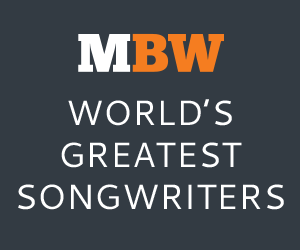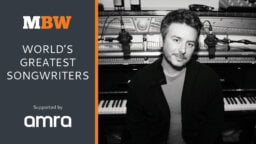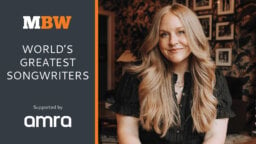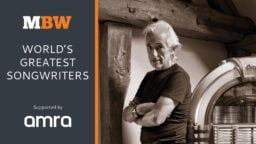MBW’s World’s Greatest Songwriters series celebrates the composers behind the globe’s biggest hits. This time out we meet Sir Tim Rice, EGOT winner and the man who supplied the words to go with the music in some of the biggest stage shows and Disney films of the last few decades. Earlier this year his phenomenal career was recognized with the presentation of the Johnny Mercer Award at the Songwriters Hall of Fame. World’s Greatest Songwriters is supported by AMRA – the global digital music collection society which strives to maximize value for songwriters and publishers in the digital age.

As a young man and aspiring songwriter, Sir Tim Rice’s main ambition was to have a track recorded by Herman’s Hermits. He failed. He did, however, go on to be one of only 18 people in history to achieve EGOT status. So…
It is telling that the self-effacing Brit is happier talking about the Herman’s Hermits shortfall than shouting about the EGOT triumph.
To the extent, in fact, that it is down to MBW to explain that he won his Emmy for Jesus Christ Superstar Live In Concert (2018); Grammys for Evita (1981), A Whole New World (1994), Aladdin (1994) and Aida (2001); Oscars for A Whole New World (1992), Can You Feel The Love Tonight (1994) and You Must Love Me (1996); and Tonys for Evita (1980) and Aida (2000).
All those winning works were created with one of his three main collaborators across a near 60-year career – Andrew Lloyd Webber, Elton John and Alan Menken.
It was a precociously talented teenage Lloyd Webber, back in the mid-1960s, who persuaded him that the Hermits’ loss could be musical theatre’s gain. Together they wrote Joseph and the Amazing Technicolour Dreamcoat, Jesus Christ Superstar and Evita.
John and Menken were central figures in Rice’s second act as one of the key creatives in Disney’s 1990s revival, contributing lyrics to The Lion King and Aladdin.
He’s also had No. 1 hits in the US (A Whole New World) and the UK (Don’t Cry for Me Argentina, I Know Him So Well).
Earlier this year, he received the Johnny Mercer Award at the Songwriters Hall of Fame (having been inducted into the organization’s ranks in 1999).
His success story starts, however, with another failure, this one less niche than the dream of penning a follow-up to Mrs Brown You’ve Got A Lovely Daughter. This was a classic: not becoming a pop star.
When, how and why did you first start writing songs?
The why is because I wanted to sell my voice as a potential pop singer. This did not work*. I sent a tape, a pretty ropey tape I’m sure, of three songs I’d written, words and music, to every record company in London.
I didn’t want to sing anybody else’s hits, because I would almost certainly be unfavourably compared. So I decided the best thing to do was to write my own songs, so nobody could say, ‘Oh it’s not as good as Mick Jagger’s version, or Tom Jones’s version’.
Of course I heard nothing back. And then I got a call from a music publishing company, out of the blue, who said, ‘We’ve been given this song by Piccadilly Records, they want one of their groups to record it’.
I said, ‘What did you think of the singer?’. To which the replied, ‘Not very much, who is he?’. I said, ‘Oh just a friend of mine, you’re right, he’s terrible’. And so a song of mine got released [That’s My Story]. And it was a flop.
But it gave me something I could carry round to people in the publishing business and the record business, trying to get some sort of job.
One publisher I played it to told me he didn’t like it, but he knew a young man who wanted to write songs for the theatre, and maybe we should meet – because you’ve got a bit of promise and perhaps you’ll improve. And that was Andrew Lloyd Webber.
I went to meet him in March or April 1965. He was dead set on the theatre. I was only vaguely set on the pop world, but he was so determined and so clear and so confident.
He’d written a musical which needed words. So I put words to it and it worked. Well, actually, that first show [The Likes of Us] didn’t work, but it proved that we could write together. And then we did Joseph [and the Amazing Technicolour Dreamcoat] for schools, and then Jesus Christ Superstar, and so on. But that was why I first wrote a song: to sell my voice.
Did it immediately click with Andrew in terms of your creative relationship – and if so, why?
Because we both admired what the other could do. It was clear to me that he had a great gift for theatre and for musicals. I mean, he also loved rock n roll, he was totally aware of what was going on. But he wanted to write a la Lionel Bart, Rodgers and Hammerstein, etc.
“I could tell he was good, and when I wrote some lyrics for him, he thought they were brilliant. I didn’t know if he was right about that, but it seemed to work and we stuck together.”
I knew all the big songs, but I didn’t really know much about the theatre. I’d hardly been to a musical. But I could tell he was good, and when I wrote some lyrics for him, he thought they were brilliant. I didn’t know if he was right about that, but it seemed to work and we stuck together.
How did you come to write Jesus Christ Superstar? And where did the word ‘Superstar’ come from?
Well, we’d written this piece for schools which had done well [Joseph]. And that led to a recording contract for an album of the show. That, in turn, got us decent, efficient management. We were eventually signed up, on the strength of Joseph, to write for three years.
In effect, we had three years to make it. It was a bit nerve-racking, because I was older than Andrew, still am actually. I was 22, and I thought, gosh, this is risky, but you know, it is an opportunity. Andrew was much more: we’ve got to do this.
I’d always had this thing about Judas Iscariot and Pontius Pilate since I was in school. I thought they were interesting characters – I’m obviously simplifying my deeply intelligent thoughts here.
I used to think, if I were around in Jesus’s time, if I were Judas Iscariot, or Pontius Pilate, would I not have done the same sort of thing?
That was always vaguely in my mind. I thought if ever I write a book, or do something creative, which I hadn’t planned to, I was bone idle really, but that would be a great topic.
And then, when we suddenly had this opportunity of three years guaranteed salary, I suggested this thing about Judas Iscariot to Andrew. He thought it was great idea.

Originally we thought it would have a book, it would have dialogue, but mainly songs. And when we finished it, our manager hawked it round to all the all the theatrical impresarios of the day, and none of them were interested. They all said, ‘No, you can’t do religion in the West End’.
But we did manage to get interest from a record company, MCA, who said, ‘Why don’t we do an album, see how that works?’
This was quite an original concept, doing the record first. But it was what actually made the piece work. We had to cut out any ideas of having dialogue, we had much better resources, we had access to a recording studio, which meant we could have a rock band and an orchestra. And this album turned out to be an extraordinarily large hit.
First, we had to put a single out, which was Murray Head singing the title track. And I know your original question was about the word ‘superstar’…
Originally, it was just called Jesus Christ. But when I was writing the lyrics to that song, I saw an advert for, I think, Tom Jones in the Melody Maker. And it didn’t say his name, it just said ‘The World’s Number One Superstar’ – and that was it.
It seemed very daring at the time – and it was, but I think using it gave us quite a big boost.
And then of course, the album was a mega hit – in America in particular, at which point every theatre guy in the West End and Broadway wanted to do it.
How much controversy was there at the time?
The BBC were reluctant to play it, although Alan Freeman, bless his cotton socks, played it four weeks running on Pick of the Pops, but it still didn’t hit in England. The BBC restricted its play, for sure.
But in America, there were no restrictions, and when the album came out, they played the it all the way through, and by early January 1971 it was No. 1, knocking off one of my heroes, George Harrison: I felt rather embarrassed.
How did you and Andrew come to write one of the last songs that Elvis ever recorded [the last track on his last album, in fact – It’s Easy For You from Moody Blue, released in 1977]?
I worked at Capital Radio and there was a very nice lady there called Linda Brooker who was a friend of Elvis Presley’s music publisher, Freddy Bienstock. Andrew and I met Freddy through Linda and had dinner with him one night, he was interested in meeting songwriters.
He said that if we wanted to submit a couple of songs for Elvis, he’d make sure he got to hear them. Which was, you know, wow!
So we wrote a couple of songs and sent them to Freddy – this is in 1974, by which time Superstar had been a big hit everywhere. And then we actually never heard a thing until two years later. An album or two came out, we weren’t on them, and then Elvis was only doing live albums for a while.
But then he did an album called Moody Blue, and ours was the last track on it, which was so great for us, because when we were kids, of course, Elvis was The King.

What brought about the parting of the ways with Andrew?
After Evita, he wanted to do a music based on T.S. Eliot’s Old Possum’s Book of Practical Cats, which obviously did not need lyrics. I was replaced by a dead poet, how about that? We just sort of drifted apart after that.
The sort of stuff he was doing, while very successful, particularly Cats and Phantom, it wasn’t really my sort of thing. I was still probably hankering to be a bit more on the rock side of things.
Anyway, I had this idea for a musical about chess and politics and love and romance set in the Cold War.
Bjorn and Benny of Abba, who you may have heard of, were intrigued by the idea and that was the beginning of Chess and the start of me spending a lot of time in Sweden working with them.
What was that like?
It was great! Again, the thing is, you’ve got to admire what your collaborators are doing, and I was a huge admirer of theirs. I had a very fun year.
The record did extraordinarily well, the show did well in London and has been a hit in multiple countries, but we still haven’t really had the definitive Broadway smash we want; we’re still hopeful about that.
How did you come to work for Disney and what was that like, almost being part of a corporation after a more freewheeling life?
Well, yes, it was rather like working for a company and I enjoyed it enormously. And it was nice to write for film rather than theatre.
At one point Disney were going to make a film of Evita, so I met a lot of the senior executives through that. And quite frankly I kept dropping hints, saying that I thought that writing for the sort of films they’d started making – they’d just started their 1990s revival, with things like The Little Mermaid and Beauty and the Beast – would be right up my alley.
It must have worked because I was asked to come in and discuss a new project, which at that time was going to be called King of the Jungle, which is daft because there’s no jungle in Kenya. It became The Lion King, of course, and I was in from the word go for that.
Halfway through, and being on the spot so to speak, I was asked to help out with Aladdin, which had been tragically affected by the death of the brilliant lyricist Howard Ashman. I stepped in to work with Alan Menken on that, including writing A Whole New World.
What was working with Elton John like on Lion King? And presumably you’re a big fan of his ‘regular’ lyricist, Bernie Taupin?
Bernie is fantastic. Bernie and I write very different sorts of lyrics. I could not write the kind of brilliant and very interesting psychological stuff he does. My admiration for Bernie is huge.
“I said, ‘Well, you won’t get him, but what about Elton John?’ Of course in the end they did get him.”
But, with The Lion King, they asked me who I wanted to write the music, and I said, ‘Well, you won’t get him, but what about Elton John?’ Of course in the end they did get him. And Elton was brilliant.
He’s subsequently always been very kind and always gives me credit for giving him another string to his bow, because he’s now had four shows on Broadway.
Did you know Elton when you recommended him, or were you just a fan?
I knew him, but I didn’t know him incredibly well. I’ve met him and I’ve been to one or two of his parties, I seem to remember – vaguely [laughs].
And what was it like working with Alan Menken?
Alan’s great. He’s more like Andrew to work with than Elton in the sense that he likes the music first, he’s very theatrical and he’s got a great knowledge of theatre history.
Do you prefer writing lyrics first or writing lyrics to music?
For me, the story must come first. You’ve got to know what the song is going to be about. I’m not really good at writing one-off pop lyrics which don’t really have a point beyond being a song.
So, once the scene is established, like Argentine lady singing on a balcony to 10,000 fans, then the composer and the lyricist both know what sort of tune and words are required, so it almost doesn’t really matter which comes first. Everything has to serve the story.
You recently received the Johnny Mercer Award from the Songwriters Hall of Fame. What was that like and what does that mean to you?
It was a great night out! And It’s obviously a great honour. Alan Menken, who has won it previously, was there on the night, chatted to me on stage and accompanied the performers singing A Whole New World and I Don’t Know How To Love Him. It was great fun.
* Rice says it didn’t work, but he does sing on a UK No. 1 record, providing backing vocals – alongside Elton John and Jack Bruce – on The Scaffold’s 1968 hit, Lily The Pink.






